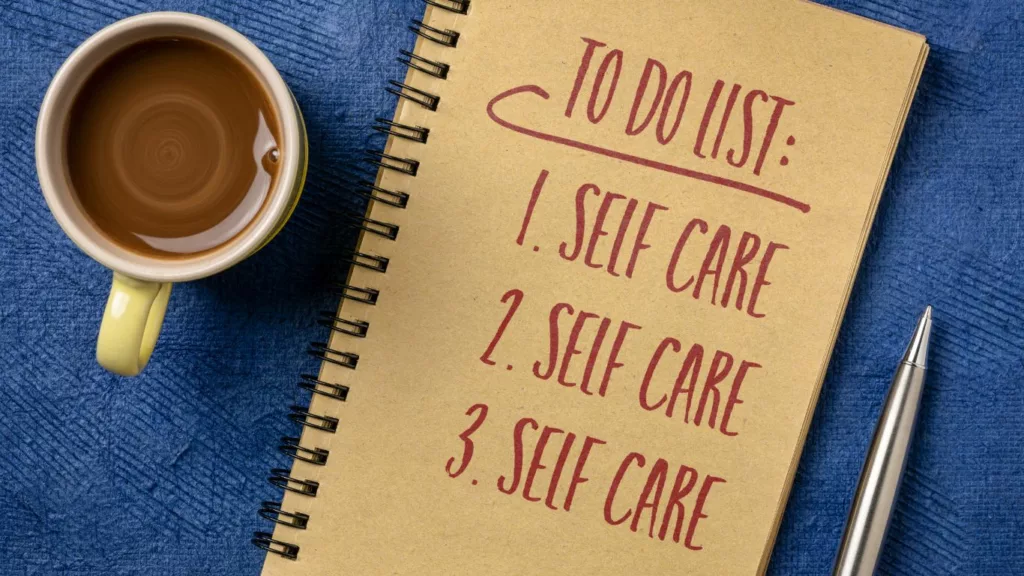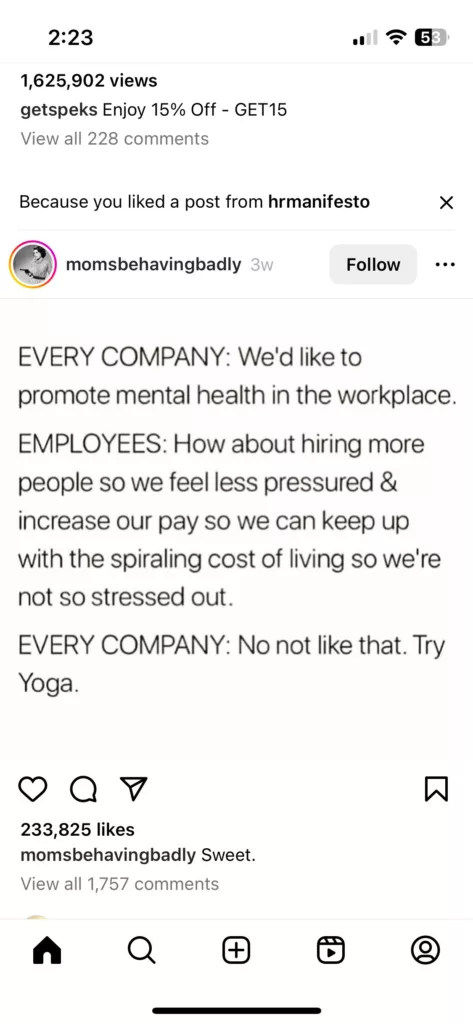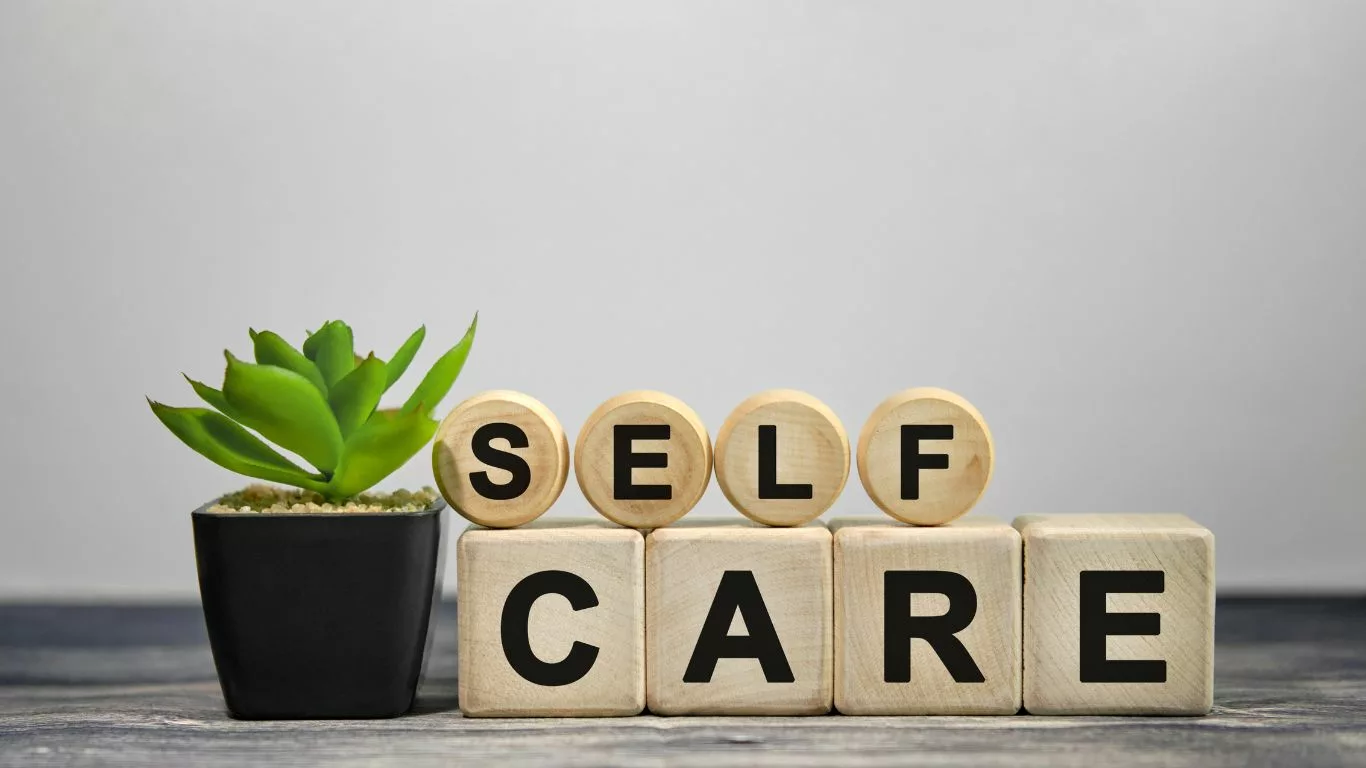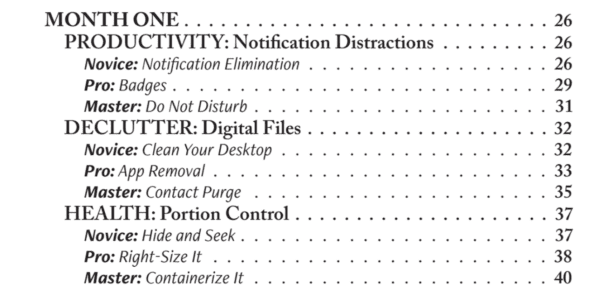Have you ever been scrolling through Instagram or TikTok and felt your blood boil at yet another post featuring someone's perfect sundae, serene bath, or woodland walk tagged #Self-Care? If you're nodding your head, you're not alone.
Look, I get it. Your life is a nonstop juggling act—caring for a family, managing a workload for two, perhaps? So, the idea of #Self-Care can sometimes feel more like a taunt than a helpful suggestion. If you've ever wanted to drop a snarky comment saying, “It must be nice to have time for self-care!” You're like 99% of our clients when they hire us.
But hold up! Let's dig a little deeper before you fling your phone in frustration. Self-care is your responsibility, but it's not all on you. Companies and organizations also play a crucial role here. It's not just about adding “cool” perks like unlimited cold brew or Zen rooms. It's about rethinking the work culture that necessitates all this self-care in the first place.

The Irony of Workplace Wellness Programs
Here at RaderCo, we get an insider's look at all sorts of wellness perks—everything from Employee Assistance Programs (EAPs) and virtual yoga classes to in-house massage therapists. Kudos to the companies for these offerings, but let's not forget one thing: all the perks in the world won't matter if employees don't have the time or mental bandwidth to use them.
Would you even need a 2-minute meditation from the insurance-provided app if you weren't sandwiched between back-to-back video meetings? Would you require an in-house therapist if your company culture didn't keep you on edge 24/7?

The Failures We've Seen
All companies mentioned are anonymous, but the struggles are real.
- Company A: The insurance provider slashed healthcare benefits but promoted a meditation app now included in their plan. Our client spent hours calling offices to find a covered psychiatrist who was actually taking patients for her 13-year-old son. Stressing over healthcare needs? That app is suddenly less appealing.
- Company B: They offer acupuncture and chiropractic services but won't cough up a dime for an ergonomic desk. One expectant mom, who was supposed to be hybrid, chose to work from home on her sit-stand desk to avoid discomfort—all because of a missing $150 standing desk in her corporate office. She felt the shaming from her team that she ‘got' to work entirely from home the last five months of her pregnancy. And she even had a doctor's note!

True Success Stories
Alright, enough of the downer stuff. Let's talk wins. A team at the University of Chapel Hill that we worked with for a year opted to spend their budget on productivity workshops and coaching over the typical parties and group lunches. Result? A more cohesive, efficient, and stress-free work environment. Read their case study.
Another client, Cook Wealth, reduced internal meetings and actually encouraged their team to—wait for it—enjoy nature walks together! And leaders led them! Read the case study summary.
Lastly, our largest client, Blueprint Medicines, provides productivity coaching packages to 15-18 individuals each year at all levels. It's not just for the executives or leaders. It's for everyone because if the people supporting the leaders aren't effective, happy, and healthy, it hurts the whole organization and brings bottlenecks of a different type.
We've implemented Design Days, where most of the company is meeting, email, and instant-message-free for an entire day once per quarter to allow everyone to do deep, focused work.
They've offered acute crisis counseling with our RaderCo Crisis Specialist for team members who have experienced things like the accidental death of a loved one, miscarriage, cancer diagnosis, and sexual assault. This is important because, while long-term therapy may be needed, the energy to find one in your plan (if it's even covered), get on a waitlist, or schedule an appointment, and then wait for that appointment is too much to bear and not helpful at the moment. Offering this option within 24-72 hours, with the expectation of one session or a few until they need or find long-term help, is invaluable to the employee and not a burden to coordinate. Read the case study.
A Call to Leaders
If you're in a leadership role, ask yourself: What workplace pressures are making your team members desperately need that #SelfCare? If you've tackled this challenge head-on, share your strategies with me. No-Meeting Friday (that you actually stick to)? Practicing email-free vacations where you shut them out of email? I want to hear it all!
So here's the final nugget: Self-care shouldn't be a burden, neither on the individual nor on the team. Let's make it something more genuine, more integrated, and ultimately more effective.
Looking to make your company the epitome of health-powered productivity? Contact RaderCo. We're in the business of changing business for the better.
Until then, find your balance and own it. Self-care is everyone's job.



